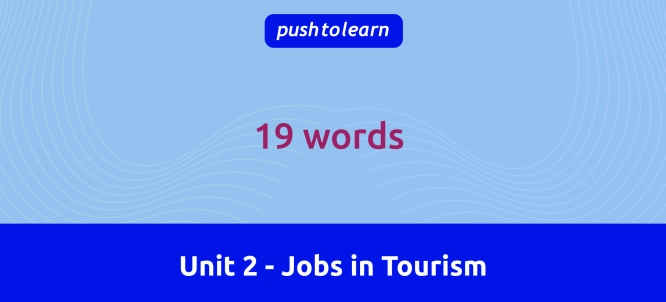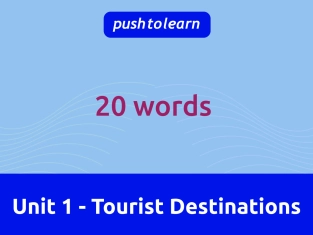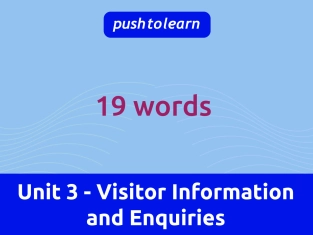by PushtoLearn
Unit 2 - Jobs in Tourism
Table of Contents
Unit 2 - Jobs in Tourism Exercises and Flashcards
These exercises focus on Unit 2 - Jobs in Tourism - English for International Tourism Pre-intermediate
Vocabulary List for Jobs in Tourism
Tour Guide (noun)
Definition: A person who leads groups of tourists and provides information about places of interest.
Example: The tour guide explained the history of the ancient ruins in great detail.
Explanation: This role is key for enhancing the travel experience with knowledge and storytelling.
Travel Consultant (noun)
Definition: A professional who advises clients on travel arrangements and bookings.
Example: The travel consultant helped us plan a honeymoon in Italy.
Explanation: Important for planning and organizing personalized trips.
Front Desk Clerk (noun)
Definition: An employee responsible for welcoming guests and handling check-ins and check-outs at accommodations.
Example: The front desk clerk quickly resolved an issue with our booking.
Explanation: This position ensures smooth operations in hospitality venues.
Concierge (noun)
Definition: A hotel employee who assists guests by providing services like booking reservations or arranging transportation.
Example: The concierge arranged tickets for the evening’s concert.
Explanation: Essential for meeting guests’ unique needs during their stay.
Housekeeping (noun)
Definition: The department responsible for cleaning and maintaining guest rooms and common areas.
Example: Housekeeping ensured our room was spotless every day.
Explanation: A critical role in maintaining high standards of cleanliness and comfort.
Shift Work (noun)
Definition: Employment with schedules that vary or occur outside standard business hours.
Example: Shift work in a hotel often includes evening or overnight shifts.
Explanation: Common in the 24/7 operations of the tourism industry.
Seasonal Employment (noun)
Definition: Jobs that are available during specific times of the year, often based on peak tourism seasons.
Example: Seasonal employment at the ski resort peaks during winter.
Explanation: Important for understanding the cyclical nature of tourism jobs.
Hospitality Industry (noun)
Definition: The sector that includes services such as hotels, restaurants, and travel.
Example: The hospitality industry relies heavily on excellent customer service.
Explanation: Provides a broad context for many tourism-related jobs.
Job Interview (noun)
Definition: A meeting where a candidate discusses their qualifications for a position.
Example: She prepared thoroughly for her job interview at the travel agency.
Explanation: A vital step in the recruitment process.
Teamwork (noun)
Definition: Collaborative effort by a group to achieve a common goal.
Example: Teamwork among the staff ensured a flawless event for the guests.
Explanation: Essential for the success of tourism operations.
Recruitment (noun)
Definition: The process of finding and hiring employees.
Example: Recruitment for summer staff begins in March.
Explanation: Necessary for filling positions in tourism organizations.
Customer Service (noun)
Definition: Assistance provided to guests or clients to ensure satisfaction.
Example: Excellent customer service led to glowing reviews from the guests.
Explanation: Central to the success of all tourism businesses.
Employee Training (noun)
Definition: Programs or activities designed to improve workers’ skills.
Example: Employee training included courses on conflict resolution and hospitality standards.
Explanation: Improves staff performance and guest satisfaction.
Salary Expectations (noun)
Definition: The amount of pay a job applicant hopes to receive.
Example: During the interview, she discussed her salary expectations with the manager.
Explanation: Important for negotiations in the hiring process.
Work-Life Balance (noun)
Definition: The equilibrium between work responsibilities and personal life.
Example: Shift work can sometimes make achieving work-life balance difficult.
Explanation: Crucial for maintaining job satisfaction and well-being.
Professional Skills (noun)
Definition: Abilities and expertise needed to perform tasks effectively in a job.
Example: Communication and organizational skills are key professional skills in tourism.
Explanation: Necessary for excelling in a competitive job market.
Interpersonal Skills (noun)
Definition: The ability to interact well with others.
Example: Interpersonal skills helped the concierge handle a difficult guest.
Explanation: Essential for roles involving direct interaction with clients or guests.
Career Development (noun)
Definition: The process of managing one’s growth and progress in a chosen career.
Example: Career development workshops helped employees plan for promotions.
Explanation: Encourages long-term engagement and skill enhancement.
Time Management (noun)
Definition: The ability to plan and control how time is spent on tasks.
Example: Effective time management allowed the tour guide to stay on schedule.
Explanation: Vital for managing the fast-paced demands of the tourism industry.

Wordlist for Unit 2 - Jobs in Tourism - English for International Tourism Pre-intermediate
|
Word |
Example |
|
tour guide |
The tour guide shared many interesting facts |
|
travel consultant |
She became a travel consultant after studying tourism |
|
front desk clerk |
The front desk clerk helped us check in |
|
concierge |
The concierge recommended a nice restaurant nearby |
|
housekeeping |
Housekeeping ensures the rooms are clean |
|
shift work |
Many employees in hospitality work in shift work |
|
seasonal employment |
The beach resort offers seasonal employment every summer |
|
hospitality industry |
The hospitality industry includes hotels and restaurants |
|
job interview |
She prepared carefully for the job interview |
|
teamwork |
Good teamwork leads to better results |
|
recruitment |
The company is focused on recruitment for new positions |
|
customer service |
Excellent customer service is key in hospitality |
|
employee training |
Employee training improves service quality |
|
salary expectations |
They discussed salary expectations during the interview |
|
work-life balance |
Work-life balance is important for employee well-being |
|
professional skills |
Professional skills are essential for career growth |
|
interpersonal skills |
Strong interpersonal skills help in customer service roles |
|
career development |
The company supports employee career development |
|
time management |
Time management is crucial in a fast-paced job |
FAQ
Why is teamwork important in tourism jobs?
Teamwork ensures smooth collaboration among staff, which is essential for providing excellent guest experiences and handling peak periods.
How can I improve my professional skills for the tourism industry?
Take courses in customer service, communication, and time management, and seek opportunities for hands-on experience in the field.
What are common challenges with shift work?
Shift work can disrupt sleep patterns and personal schedules, making it challenging to maintain work-life balance.
How does career development benefit tourism professionals?
Career development helps professionals grow their expertise, stay motivated, and qualify for promotions or new roles.

